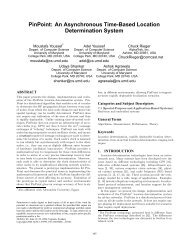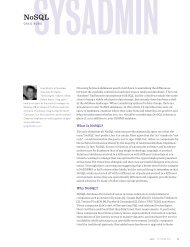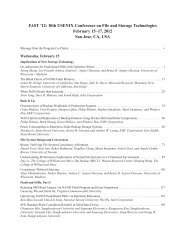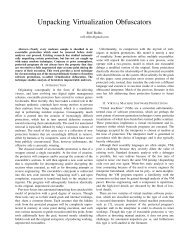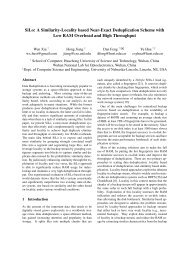2nd USENIX Conference on Web Application Development ...
2nd USENIX Conference on Web Application Development ...
2nd USENIX Conference on Web Application Development ...
Create successful ePaper yourself
Turn your PDF publications into a flip-book with our unique Google optimized e-Paper software.
Permissi<strong>on</strong> Popular Unpopular<br />
Plug-ins 2.80 % 0.00 %<br />
<strong>Web</strong> access 82.0 % 60.8 %<br />
All domains 51.6 % 21.8 %<br />
Specific domains 30.4 % 39.0 %<br />
Browser manager(s) 74.8 % 43.4 %<br />
Table 1: We measure the prevalence of permissi<strong>on</strong>s in 1000<br />
Google Chrome extensi<strong>on</strong>s, split into the 500 most popular and<br />
500 less popular. For web access, we report the highest permissi<strong>on</strong><br />
of either the c<strong>on</strong>tent script or core extensi<strong>on</strong>.<br />
Plug-ins. Only 14 of the 500 extensi<strong>on</strong>s include plug-ins.<br />
Browser managers. The majority of security warnings<br />
are caused by the window manager, which is requested<br />
by almost 75% of the 500 extensi<strong>on</strong>s. Requesting access<br />
to the window manager generates a warning about<br />
history access because history is indirectly available<br />
through the window manager. The bookmark and geolocati<strong>on</strong><br />
managers are requested infrequently: 44 times<br />
and <strong>on</strong>ce, respectively.<br />
All domains. Half of the 500 extensi<strong>on</strong>s request alldomain<br />
access for either c<strong>on</strong>tent scripts or the core extensi<strong>on</strong>.<br />
52% request access to all http sites, and 42%<br />
ask for all https sites.<br />
Specific domains. One-third of extensi<strong>on</strong>s <strong>on</strong>ly request a<br />
set of specific domains. This reduces the attack surface<br />
and removes the possibility that an extensi<strong>on</strong> is snooping<br />
<strong>on</strong> sensitive web data.<br />
No warning. Only 43 of the 500 extensi<strong>on</strong>s do not request<br />
access to a security-relevant permissi<strong>on</strong>. 38 do not<br />
ask for any permissi<strong>on</strong>s at all; they load normal web sites<br />
into their extensi<strong>on</strong> windows or apply “themes” to the<br />
user interface. The remainder use browser managers that<br />
are not relevant to privacy or security.<br />
3.1.2 Unpopular Extensi<strong>on</strong>s<br />
Not all of the extensi<strong>on</strong>s listed in the “most popular” directory<br />
ranking are popular. After approximately the first<br />
500 of 1000 popularity-ranked extensi<strong>on</strong>s, the number of<br />
users per extensi<strong>on</strong> abruptly decreases, and applicati<strong>on</strong>s<br />
are no l<strong>on</strong>ger ranked solely according to the number of<br />
users. (Although the ranking algorithm is private, we believe<br />
it incorporates time.) Figure 3 shows the transiti<strong>on</strong>.<br />
16.2% of the bottom 500 extensi<strong>on</strong>s have fewer than ten<br />
users. These 500 low-ranked extensi<strong>on</strong>s are of uneven<br />
quality. E.g., two of them are unaltered versi<strong>on</strong>s of the<br />
example extensi<strong>on</strong> <strong>on</strong> the developer web site.<br />
Table 1 presents the results of our survey of the 500<br />
less popular extensi<strong>on</strong>s. 71.6% of the less popular extensi<strong>on</strong>s<br />
have at least <strong>on</strong>e security-relevant permissi<strong>on</strong>.<br />
When compared to the top 500 extensi<strong>on</strong>s, the unpopu-<br />
4<br />
78 <strong>Web</strong>Apps ’11: <str<strong>on</strong>g>2nd</str<strong>on</strong>g> <str<strong>on</strong>g>USENIX</str<strong>on</strong>g> <str<strong>on</strong>g>C<strong>on</strong>ference</str<strong>on</strong>g> <strong>on</strong> <strong>Web</strong> Applicati<strong>on</strong> <strong>Development</strong> <str<strong>on</strong>g>USENIX</str<strong>on</strong>g> Associati<strong>on</strong><br />
!"#$"%<br />
16000<br />
14000<br />
12000<br />
10000<br />
8000<br />
6000<br />
4000<br />
2000<br />
0<br />
200<br />
229<br />
258<br />
287<br />
316<br />
345<br />
374<br />
403<br />
432<br />
461<br />
490<br />
519<br />
548<br />
577<br />
606<br />
635<br />
664<br />
693<br />
722<br />
751<br />
780<br />
809<br />
838<br />
867<br />
896<br />
925<br />
954<br />
983<br />
&'()*+$,-.%/+01%<br />
Figure 3: Users per extensi<strong>on</strong>. We omit the first 200 for graph<br />
clarity; the most popular extensi<strong>on</strong> has 1.3M users.<br />
lar extensi<strong>on</strong>s request far fewer permissi<strong>on</strong>s than popular<br />
extensi<strong>on</strong>s. We hypothesize that this is because less popular<br />
extensi<strong>on</strong>s offer less functi<strong>on</strong>ality. All of the differences<br />
are significant at a 1% significance level.<br />
Unranked extensi<strong>on</strong>s are strictly less popular than the<br />
unpopular extensi<strong>on</strong>s in our data set. If <strong>on</strong>e were to review<br />
the remaining 5, 696 unranked Google Chrome extensi<strong>on</strong>s,<br />
we expect their permissi<strong>on</strong> requirements would<br />
be equivalent to or less than the permissi<strong>on</strong> requirements<br />
of these 500 unpopular applicati<strong>on</strong>s. We note with cauti<strong>on</strong><br />
that future studies <strong>on</strong> permissi<strong>on</strong>s need to c<strong>on</strong>sider<br />
the effect of popularity. E.g., a study that looks at the full<br />
set of 6, 696 extensi<strong>on</strong>s to evaluate warning frequency<br />
would would likely underestimate the number of warnings<br />
that users see in practice by approximately 20%.<br />
3.1.3 Evaluati<strong>on</strong><br />
User C<strong>on</strong>sent. Nearly all popular extensi<strong>on</strong>s (91% of the<br />
top 500) generate at least <strong>on</strong>e security warning, which<br />
decreases the value of the warnings. History and alldomain<br />
permissi<strong>on</strong>s are requested by more than half of<br />
extensi<strong>on</strong>s; users have no reas<strong>on</strong> to be suspicious of<br />
extensi<strong>on</strong>s with these permissi<strong>on</strong>s because they are not<br />
anomalous. However, warnings about plug-ins are rare<br />
and therefore potentially notable.<br />
Defense in Depth. This study shows that the permissi<strong>on</strong><br />
system dramatically reduces the scope of potential<br />
extensi<strong>on</strong> vulnerabilities. A negligible number of extensi<strong>on</strong>s<br />
include plug-ins, which means that the typical extensi<strong>on</strong><br />
vulnerability cannot yield access to the local machine.<br />
This is a significant improvement over the Firefox<br />
and Internet Explorer extensi<strong>on</strong> systems, which provide<br />
all extensi<strong>on</strong>s with access to the local file system. We<br />
also find that all-domain access is frequent but not universal:<br />
18% of popular extensi<strong>on</strong>s need no web access,<br />
and 30.4% <strong>on</strong>ly need limited web access. This means<br />
that the permissi<strong>on</strong> system prevents half of popular extensi<strong>on</strong>s<br />
from having unnecessary web privileges.




